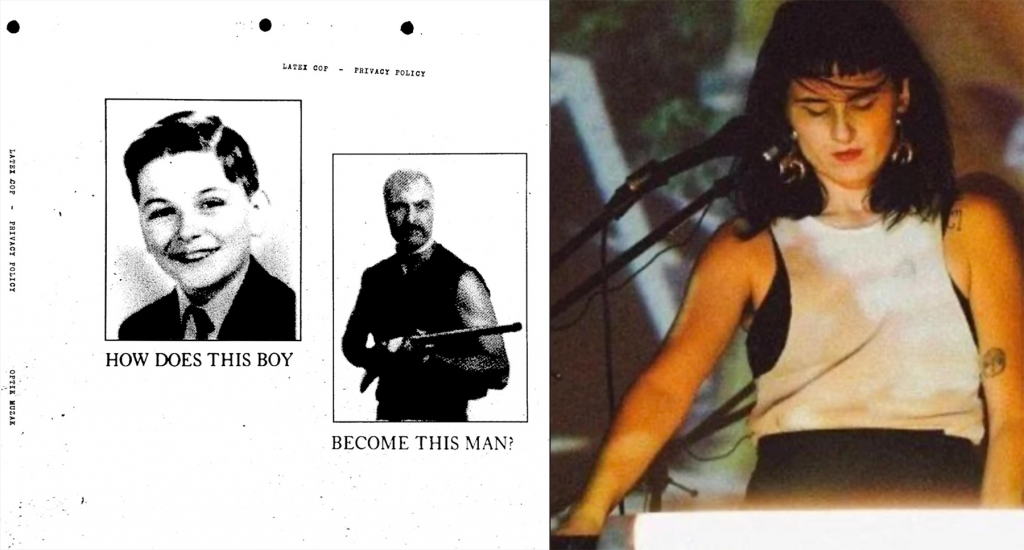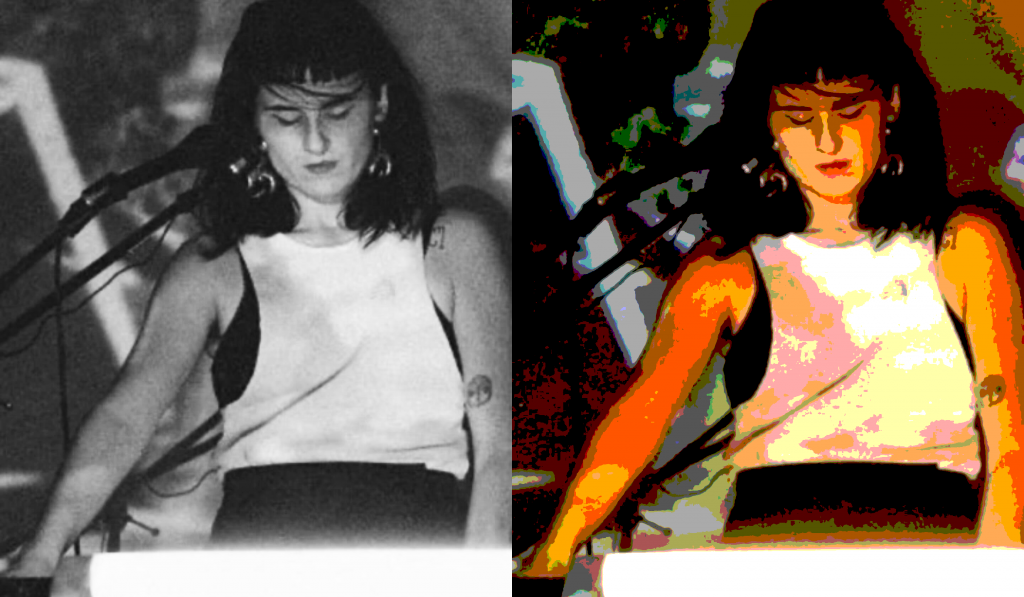By Keith Walsh
On Privacy Policy, her just released 14 track set by Latex Cop, New Orleans-based artist Sara Storm revels in the inspiration she finds in studies of criminal justice and penal systems. Informed by French philosopher Michel Foucault, and the writings of author June Stephenson (I think she’s American), Storm recorded the album, which fits squarely in the experimental, lo-fi genre, primarily in Miami, Florida, under the auspices of a producer known Frank ‘Rat Bastard’ Falestra.
I had the chance to discuss with Storm this latest musical offering, including stylistic approaches, gear, and the philosophy behind Latex Cop. My review of Privacy Policy is at Synthbeat.com .
Popular Culture Beat: What’s the attraction of remaining somewhat incognito by obscuring the vocals?
Sara Storm: I find that by obscuring vocals, what is being said is less prevalent and can be interpreted any way a person wishes. For this project specifically I wanted it to sound as if speaking through an intercom system. There are a few tracks where the vocals are more prominently focused with similar story lines. While studying in school for criminology, I read Foucault’s Birth of a Prison. A lot of lyrical concepts were inspired by the reading of his theory on criminology. For example, in many of the tracks I come back to the idea that there is an all seeing eye, which is a nod to the Panopticon. While I wanted lyrically to write from the standpoint of police procedure, I also could see victims of law points of view. Whatever that fear was to be alone, to be cornered, to not feel like one has access to respond that’s prebuilt in the mind. We have to learn the correct ways with which to respond when interacting with police and today we find that mostly through infographics such as, what to do at a traffic stop, how to respond when questioned. So, I toggled with both characters throughout this project: the procedure and the perceived.
Popular Culture Beat: Are the lyrics improv or written as poetry?
Sara Storm: At the time of working with this project and leaving Nail Club in the background, I had been asked to play several shows in Miami. Miami was a hub for a specific noise festival and projects like Calnepuelco and Onset. They were very inspiring to me and much of it was improv. The majority of Latex Cop tracks ended up being improv in response to the attitude that one must not always be composed. This is why on the record you have half live tracks and half studio tracks. It was important that I somehow archive this experiment of fly by storytelling, so I could learn to see myself completely connected with my gear and the functionality of what I had learned through reading about criminology as well. All live footage of these events no longer exist to my knowledge, so these recordings are it.
Popular Culture Beat: There’s live and studio tracks here. What were the circumstances of the recordings?
Sara Storm: The studio tracks were recorded at Rat Bastard’s studio in Miami, as well. I was so nervous to have these guys watch me play in such an intimate tiny setting but, I was told I did well since Rat didn’t fall asleep and patted me on the back when it was all finished. I had no way of knowing which song was going to come forth when building sequences, as I had only saved drum patterns through the 808 I was using at the time. So, I was sitting there recording in a complete sweat, hoping I could get through it. It was complete agony, but when I heard the end result I felt confident that I had achieved what I perceived many “noise artists” were going for in a stage setting.

Popular Culture Beat: What gear are you using this time around?
Sara Storm: I primarily used an 808, Korg ‘logue series for this project as they are the easiest to program on the fly. Though at Rat’s house, I was panicked when we discovered that my power cable had broken and then I had no way to record. Luckily, he had the cable I needed and we moved forward. That has since never happened again! Only two of the tracks were recorded with a Tascam in my bedroom, “Vulnerable Door” and “We Know Where You Live”. “We Know Where You Live” is a song dedicated to my son, Anchor. The samples of the phone ringing was an actual police number I had to call numerous times that no longer worked. It was very fitting. Of all the songs on this album, it’s the one I cherish.
Popular Culture Beat: Do you ever feel the attraction of breaking out of the lo fi parameters?
Sara Storm: I do feel as if I am stuck in the ‘lo-fi parameters’ because using my four track is like having an extension of my body. A computer feels completely unnatural to me and there’s the fear that I will lose everything. So, a lot of that sound comes from using a very well loved Tascam and is not at all intentional.
Popular Culture Beat: Please explain the significance of the name Latex Cop, either as a surreal moniker or something with metaphoric meaning. How would this fit in with your degree and interest in criminal justice?
Sara Storm: The name Latex Cop comes from the idea that communities police each other, especially how they interact sexually. Bob Flanagan who was this incredible artist who was dying of an illness, used sexuality as a method of healing, but he was hyper aware that there were people who did not have the same need that he did. I believe he probably felt that people used BDSM as a shock tactic, when for himself it was extremely pivotal for his survival. In the last few years we have seen this trend come back. No one wants to sleep with a cop, but perhaps everyone has that in them somehow to say “you don’t need it as much as I do, in this way”. That’s what I mean by personal policing. Yes, they make latex cop suits, but who are the people buying them and what are their fantasies? I had the encouragement from an artist named Human Fluid Rot to wear latex at a festival we played together when I felt extremely vulnerable about tapping into something that may be a lifestyle to other people. But, today you’re either in a woke society that’s very PC and very careful to not step on people’s toes [or not, I guess. KW]. While this project was a short lived experiment more for myself than others I do hope that it will be enjoyed by many.
The artwork I chose is from this book called ‘Men Are Not Cost Effective’ by June Stephenson. I volunteered at Open Books, Books for Prisoners in Florida and discovered this book. The artwork alone was really heartbreaking but it had an edge to it. Like how exactly does this boy become this man? Will we ever truly know? If anyone has an interest in reading the history of crime Foucault and Stephenson have incredible theories. It’s incredibly inspiring.
Latex Cop On Bandcamp
Nail Club On Bandcamp
Optik Muzak On Bandcamp
About Frank ‘Rat Bastard’ Falestra
‘Privacy Policy’ Review At Synthbeat.com
finis

